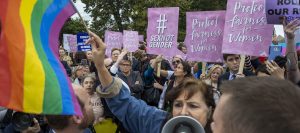The U.S. Supreme Court on Tuesday heard arguments in three cases that could decide if employers are legally prohibited from firing people because of their sexual orientation or gender identity.
Two of the cases, from New York and Georgia respectively, involve men who were allegedly fired for being gay. The third case, from Michigan, involves a transgender woman who claims she was fired from a funeral home after she began transitioning. The cases hinge on what exactly is covered by the Civil Rights Act of 1964, which bars discrimination based on “sex” but doesn’t explicitly include sexual orientation or gender identity.
Arguments in the cases took place Tuesday morning and involved the Supreme Court justices clashing over the definition of the word “sex,” CNBC reported. Justice Elena Kagan, for example, reportedly argued that the law favors the fired employees and the Civil Rights Act does cover sexual orientation. However, other conservative justices suggested LGBT worker protections should be handled by lawmakers rather than the Supreme Court.
Multiple reports ultimately described the justices as “divided” after Tuesday’s arguments, and it was not clear what ruling the court might hand down. The Supreme Court isn’t expected to deliver a decision in the case until sometime next year.
However, whatever happens, the cases may have significant implications for the real estate industry because it could increase financial uncertainty for would-be LGBT homebuyers. The concern is that if LGBT workers fear discrimination in the workplace, or actually do end up losing their jobs, they will be less likely to make major longterm financial investments such as buying a house.

Jeff Berger
“We’re concerned that if the ruling goes the wrong way, homeownership rates in the LBGT community would fall,” Jeff Berger, founder and president of the National Association of Gay and Lesbian Real Estate Professionals, told Inman Tuesday. “It’s not just about these folks who are being discriminated against, it’s also about agents and their customers. I think everyone should be concerned.”
 4 things to know about working with military buyers and sellers
How to best serve the heroes who have served the United States of America READ MORE
4 things to know about working with military buyers and sellers
How to best serve the heroes who have served the United States of America READ MORE
Financial uncertainty could also theoretically exacerbate an existing homeownership divide; a report from NAGLREP and Freddie Mac, released earlier this year, shows that only 49 percent of LGBT Americans own their homes, compared to 65 percent of the broader public. That discrepancy is due to a number of factors, but in any case, opening up LGBT workers to potential discrimination is unlikely to help close it.
Berger also said that homeownership rates fall further when looking at specific groups, such as transgender people of color. And a ruling that allows for people to be fired for sexual orientation could reverberate across the real estate industry, hurting the people who lose their jobs and the agents who serve them.
“If they were able to be fired from their jobs for who they are,” he added, “it would take them out of the buyer pool.”
Despite these issues, LGBT Americans are in fact interested in owning their houses; the report from NAGLREP, for example, found that 72 percent of LGBT renters want to own a home in the future, though “46 percent of LGBT renters fear discrimination in their future home buying process.”
Berger said that the cases that went before the Supreme Court Tuesday are also important because there are many LGBT people working in real estate who, unlike agents, are employees rather than independent contractors. And those people, he argued, deserve to have their rights protected.
Update: This post was updated after publication with additional information and comments from NAGLREP President Jeff Berger.
Source: click here














